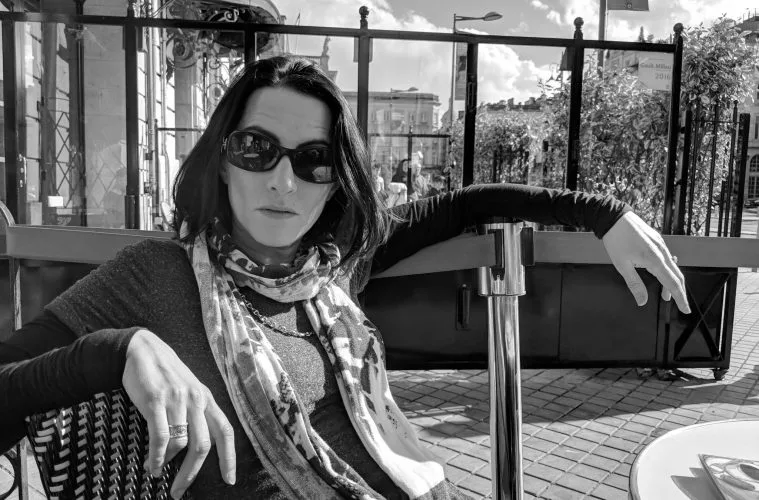
You have a mind to keep me quiet and although you can try, better men have hit their knees and bigger men have died. I’m gonna raise, raise hell. There’s a story no one tells. You gotta raise hell.
To innovate is to make changes in something established, especially by introducing new ideas, methods, or products. There are few things in our culture more tied to the establishment than Capitalism being about making money and survival of the fittest, with fittest defined by the people who are already in power, namely white men.
It flows, then, that there can be nothing more innovative than a consulting company designed to introduce the idea that our companies have to start accepting people as 100% who they are, people have to be 100% clear about what they want and what they need, and we, as a society, have to start 100% connecting to each other.
Here’s why it matters that it is 100% across the board: A revolution requires mass participation. When one womxn shows up and owns her power, she can be dismissed (literally and figuratively), and frequently is. When every womxn everywhere does it, someone has to start paying attention.
Helping womxn do this – and getting the world to listen – is exactly why Emily Weltman founded her consultancy practice, Collective Flow Consulting, just over one year ago.
After 20+ years working in Corporate America, in advertising, brand, environmental, apparel, and graphic design, she had worked with some of the biggest companies and on some of the biggest branding and marketing campaigns, and still, she says, she felt like she was constantly treated as a secretary from the 1960’s vis a vi Mad Men vs. a respected and needed member of the team.
She walked away this 20+ year career and started her own business, helping other innovative womxn finds success on their own terms. Through her consulting practice, she helps her clients pitch, create company policies, and, charge what they should be charging. She also writes fervently and frequently about the need for an entirely new economy and the rethinking of all the structures that support it.
Everything she does is grounded in economic equity, gender equality, and racial justice, including an upcoming book on womxn and the future of work and social entrepreneurship. And did I mention she’s mom to two littles and currently navigating homeschooling in the midst of the pandemic and her city (Portland) being on fire?
As Emily says, “In order to shift culture to a more equitable place, we have to build better companies from the ground up. After twenty years of being gas-lighted by Corporate America, I realized trying to fix something from the inside is a Sisyphean task. So I set out to build companies that are grounded in treating people the way I wanted to be treated.”
And that work – building companies from the ground up that are treating people the way people should be treated – is about so much more than pitching, HR policies, and business development – though those are huge and important steps. It really is about acknowledging that we, as a society, have to do better to support all people, and we have to upend it all. Question everything. Starting today.
Like dual North Stars, these are the two forces that drive her work.
Here’s why this duality is so important. I shared a post on my own Instagram featuring a t-shirt made by the brand Cora. On this shirt the word empowered is crossed out and replaced with the word powerful. The text from Cora said, “We don’t believe in empowering womxn, we believe in helping them remember – and helping them feel – the inherent and inexorable power within them that no one can ever grant or take away.”
The response was overwhelming! Everyone agreed and cheered, “Yes! We don’t need anyone to give us power – we just have to remember that we’ve had the power all along,” followed by fire emojis, raised fist emojis, and hearts.
In the midst of celebration, Emily is there to remind us all that yeah, it’s great to teach people to stop using the word empowered because we are here “to give legitimacy to powerful ideas that have often been overlooked.” But, we also need to remember that claiming that power – speaking up, even – can and does backfire. As she so poignantly puts it, “Having the power to speak up sounds great until you speak up, and you notice male executives in the back of the room whispering, ‘Who’s that?’ to each other.”
Claiming our power requires more than a graphic t. It requires wide mass participation. We have to all start claiming our power. together. Remember, if one womxn speaks up, she can be dismissed (literally and figuratively), if all womxn start speaking up, someone has to start paying attention.
This is the face of a new and innovative Feminism. For Emily, it can only be implemented with radical acceptance, radical authenticity, and deep intersectionality. All of which she discusses frequently in her writing and in her work with clients. All of which is truly innovative.
Radical acceptance: We, as business leaders, have to build work cultures that promote people thriving. People have a variety of needs, work flows, skills, and fears. We have to accept all of this and figure out how to work with people, not have people work for us. This might look like flexible work schedules, remote teams, less micro-managing, and creating a safe space for all people to follow their own groove and find their own path to productivity.
It is really about giving people the space to show 100% show up as who they are. And it is about amplification. Not in a trendy buzz word sort of way, but in the way that means all voices are valued and all perspectives are shared with the decision makers.
And here’s the kicker. When we do this, people feel safe, people feel valued, and people feel understood. When people feel safe, valued, and understood, they are able to dig deep into their souls and have their most innovative ideas and do their best work.
Radical authenticity: We, as womxn, and citizens of the world, have to show up as our true selves. We have to stop leaning in and taking direction from the people who have always been in power. And we have to be 100% clear about what we want and what we need, in order to thrive.
There are countless stories about womxn being told not to be who they actually are – or at least to pretend not to be – and it often shows up in how we are told to dress. Arlan Hamilton, founder of Backstage Capital, tells a story in her book, It’s About Damn Time: How to Turn being Underestimated into Your Greatest Advantage, about meeting an investor early on, who was also a womxn of color and a potential key connection. The womxn told her that if she wanted to be taken taken seriously, she would have to “step up” her wardrobe (which, by the way is exactly like a white male tech startup founder, in jeans, a hoodie, and sneakers).
After some soul searching, Arlan decided that if Backstage Capital was going to happen, it was going to happen because she was exactly who she was. Changing her clothes would change her confidence level.
We think it’s no big deal to put on the pencil skirt they say we should – we are just doing what’s appropriate in an industry we chose. The truth is when we wear what the people in power say we should, instead of what makes us feel like our truest selves, our confidence wanes, and they get to stay in power. That’s how patriarchy works.
Deep intersectionality: Anyone who follow me knows where I stand on this. We have to start figuring out how to work together against a common enemy. We are no longer accepting diversity or bi-partisan as slogans. We have to 100% start connecting to each other.
As Daniel Juday, said, “Inclusion is no being asked to dance or even to D.J., Inclusion is being asked to help plan the party.” We are long past the time for excuses and single-issue focused movements.
Climate change is connected to gender parity is connected to racial equity is connected to economic justice.. It’s no longer acceptable to say that only white people applied for a job or anything even remotely close to it. It’s no longer enough to have a sustainable supply chain and ignore people’s choice of pronouns. We. Have. To. Do. It. All.
Companies that are consciously incorporating all of this are the kind Emily is helping to build. They are the companies of the new economy we are fighting to create. New Economy, hmm. That’s another one of those buzz words. What does it even mean?
There’s a range of views on this from fixing capitalism to going back to a full barter system. Maybe the confusion is that just having a new economy doesn’t guarantee anything will be any better than it ever has been.
This is where Emily, as a consultant and a writer, is her most innovative:
It is about changing the end goal of work.
Are you here to change the world or change your SES?
Creating a new path for leaders, one that is guided by purpose, has a different goal.
It is not about creating a world with equal pay.
The goal is much bigger: to create a just world, where pay isn’t a measure of success and equal pay is a byproduct of widespread equality.
Perhaps the thing we are creating is less a new economy and more an Innovative Economy – where new ideas, methods, and products are welcome to such a degree that there is no more establishment.
If you are a womxn running an innovative business and want to explore how Emily can help you build a better business, reach out today via her website.
If you are a womxn or BIPOC, who is also on a mission to replace the establishment with innovation by contributing to the Future of Work, follow and connect with Emily on Instagram, Medium, and LinkedIn.
This article is part of a series by LaKay Cornell on innovation, to read the next article in the series click here.





